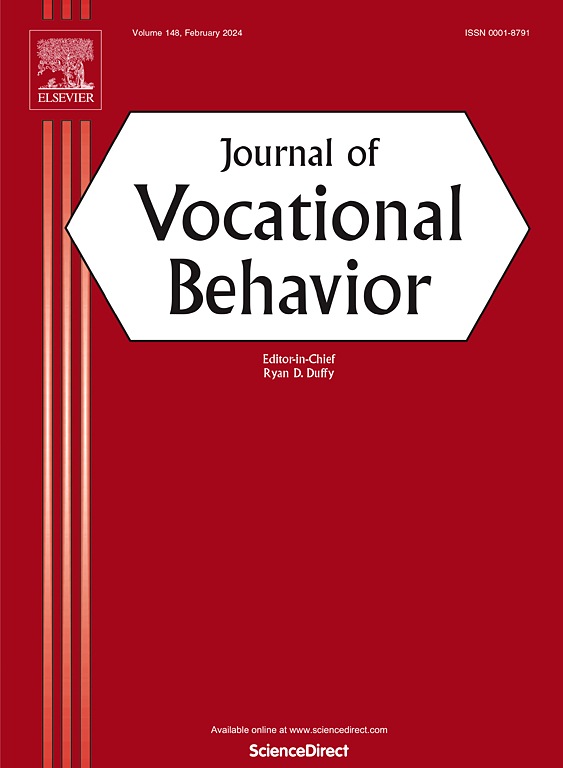Goal orientation, time pressure, and daily job crafting profiles: an integration of job demands-resources model and approach-avoidance perspective
IF 5.2
1区 心理学
Q1 PSYCHOLOGY, APPLIED
引用次数: 0
Abstract
Despite the emerging research on job crafting profiles at the general, monthly, and weekly levels, we have limited knowledge of how and when employees combine different job crafting strategies in daily work. Integrating the job demands-resources model and the approach–avoidance perspective, the present research investigates job crafting profiles at the daily level and the antecedents and consequences of daily job crafting profiles. Using two experience sampling method samples (Sample 1: N = 92, four times per day across 10 consecutive workdays; Sample 2: N = 46, four times per day across 10 consecutive workdays), we found four quantitatively distinct (passive, moderate, active, and intensively active) job crafting profiles at the daily level. Individual trait performance-prove goal-oriented employees and daily time pressure were positively related to the intensively active job crafting profile. Moreover, daily job crafting profiles were found to significantly differentiate employee daily work engagement, task performance, and work-family conflict, such that intensively active job crafters reported the highest work engagement, task performance, and also the highest time- and strain-based work–family conflicts. Theoretical and practical implications are discussed in detail.
目标导向、时间压力和日常工作制作概况:工作需求-资源模型和方法-回避视角的整合
尽管在一般、每月和每周层面上对工作制定概况的研究正在兴起,但我们对员工在日常工作中如何以及何时结合不同的工作制定策略的了解有限。本研究结合工作需求-资源模型和方法-回避视角,探讨了日常层面的工作塑造特征及其前因和后果。采用2个经验抽样法样本(样本1:N = 92,每天4次,连续10个工作日;样本2:N = 46,在连续10个工作日中每天4次),我们发现在日常层面上有4种不同数量的工作(被动、适度、主动和高度主动)。个体特质、绩效证明型、目标导向型员工和日常时间压力与密集主动的工作制作档案呈正相关。此外,我们发现日常工作制作档案显著区分了员工的日常工作投入、任务绩效和工作-家庭冲突,例如,高度活跃的工作制作者报告了最高的工作投入、任务绩效,以及最高的基于时间和压力的工作-家庭冲突。详细讨论了理论和实践意义。
本文章由计算机程序翻译,如有差异,请以英文原文为准。
求助全文
约1分钟内获得全文
求助全文
来源期刊

Journal of Vocational Behavior
PSYCHOLOGY, APPLIED-
CiteScore
13.10
自引率
5.40%
发文量
85
期刊介绍:
The Journal of Vocational Behavior publishes original empirical and theoretical articles offering unique insights into the realms of career choice, career development, and work adjustment across the lifespan. These contributions are not only valuable for academic exploration but also find applications in counseling and career development programs across diverse sectors such as colleges, universities, business, industry, government, and the military.
The primary focus of the journal centers on individual decision-making regarding work and careers, prioritizing investigations into personal career choices rather than organizational or employer-level variables. Example topics encompass a broad range, from initial career choices (e.g., choice of major, initial work or organization selection, organizational attraction) to the development of a career, work transitions, work-family management, and attitudes within the workplace (such as work commitment, multiple role management, and turnover).
 求助内容:
求助内容: 应助结果提醒方式:
应助结果提醒方式:


